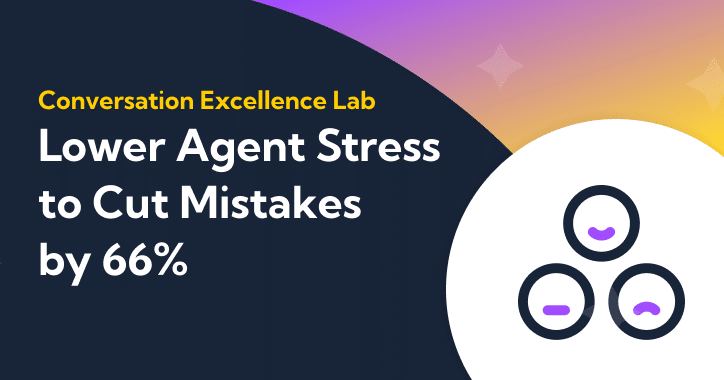As contact centers incorporate new technology and practices to keep up with shifting industry trends and competitors, call scripts remain one of the most widely used tools in the industry.
So how useful is the classic script for agents alongside a shift to a remote or hybrid work environment? Considering that remote agents are more isolated from their coworkers and managers, how does their script usage and the benefits they garner from scripts change?
The Conversation Excellence Lab surveyed 567 in-person, remote, and hybrid agents to learn the answers to the questions above.
We found:
- Remote and hybrid agents use their scripts slightly more than in-person agents — and their managers know it.
- Remote agents believe their scripts are less effective in comparison to in-person and hybrid agents.
- Hybrid agents have the most input in writing their scripts; remote agents have the least.
What this could mean:
- Remote and hybrid agents feel less confident about going off-script because, due to proximity, they don't have as many opportunities to pick up new best practices from the coworkers around them.
- High script usage increases awareness of problems with the script itself.
- Remote agents are less empowered to provide input on scripts since, without an in-person relationship with their manager, they feel cut off from making suggestions based on on-the-spot feedback.
Subscribe to future Conversation Excellence Lab reports below:
Remote and Hybrid Agents Stick to Their Scripts
Our survey included 245 in-person agents, 123 remote agents, and 199 hybrid agents. We asked each respondent to rank how much of their script they use from 1 (none of it) to 5 (all of it).
Of the three, remote agents reported using their scripts the most (3.69). Hybrid agents closely followed (3.68). In-person agents reported the lowest average script usage (3.55).
Figure 1: Script Usage By Work Environment
It’s surprising at first glance that remote and hybrid agents use more of their scripts than in-person agents. But it’s possible that with less proximity to their coworkers, they default to using a script instead of taking suggestions from colleagues, or picking up new and better phrasing and objection responses from overhearing calls.
This could be helpful for new agents getting comfortable in a new role. It could also create limitations for more tenured remote and hybrid agents. New agents, regardless of location, need a roadmap to help bring calls to the desired conclusion. However, as agents become more comfortable in their role, the script becomes more of a hindrance as they find improvised lines that achieve the conclusion faster or avoids common pitfalls.
Not only do in-person agents use their scripts the least, but their coworkers do too. We asked respondents to rate their coworkers’ script adherence on a scale of 1-5. Remote and hybrid agents’ average answers were fairly close (3.55 and 3.51, respectively). Meanwhile, in-person agents believed their coworkers used the least amount of their scripts (3.29). This points to the power of social proof.
Without evidence to the contrary, remote agents believe their coworkers are following their scripts, and do the same. In-person agents overhear calls and receive evidence to the contrary, and behave accordingly.
Figure 2: Estimated Coworker Script Usage By Work Environment
Remote and hybrid agents also assume their managers believe they use more of their scripts. We asked respondents to rate how much of their script their manager believed they used on a scale of 1-5. Remote and hybrid agents were nearly identical in their averages (3.93 and 3.92, respectively). In-person agents once again reported a lower average (3.77).
Figure 3: Perceived Manager-Estimated Script Usage By Work Environment
This is significant in a remote or hybrid environment where managers have less supervision over their agents' workday and more pressure is put on compliance measures like script adherence. When managers can't walk the floor and respond to raised hands for assistance or address improvised responses, script adherence is a straightforward metric for managers to encourage in remote agents.
Remote and hybrid agents may be more compliant with a script, but in-person agents may be compliant with the spirit of a script. Managers should assess the effectiveness of both groups and decide whether intervention is necessary so remote agents feel empowered to make calls on their own, while in-person agents are still staying compliant.
Remote Agents Believe Their Call Scripts are Less Effective
Given their higher script usage, it would be easy to assume that remote and hybrid agents have a higher opinion of their scripts than in-person agents. Our survey suggests the opposite: Remote agents reported the lowest average belief that their scripts are effective.
When asked to rank the effectiveness of their scripts from 1-5, remote agents averaged 3.38. Hybrid agents had a higher opinion at 3.53, with in-person agents reporting the highest average of 3.61.
Figure 4: Agent Perception of Script Effectiveness By Work Environment
Remote agents’ distrust of their script could be due to how much of it they use. Since they report using more of their script than in-person agents, they are more aware of the faults their scripts contain. With no other choice but to follow it — rather than taking cues from other agents or their managers on where an improvement could be made — remote agents may feel bound to a prescriptive tool. Meanwhile, in-person agents may trust their scripts as a jumping-off point for calls before using improvised techniques.
With 2 out of 3 agents wishing they could make a change to their script, this doesn’t help remote agents’ morale. Since agent job satisfaction typically peaks around the 3-5 year mark, managers should seriously consider how to improve script effectiveness.
Remote Agents Have the Least Input on Their Call Scripts
It’s also possible that remote agents’ lack of confidence stems from having low involvement in writing their own scripts. As we illustrated in our recent report, agents with the least involvement in script-writing were the most likely to want to change everything about it.
This extends to remote agents. When asked to rank their involvement in writing their script from 1-5, remote agents had the lowest average score of 2.75. By comparison, in-person agents averaged 3.06 while hybrid agents reported nearly a whole point more (3.61).
Figure 5: Agent Involvement in Script Writing By Work Environment
Out of all the metrics we measured, this is the largest divergence between remote and hybrid agents. While remote agents may feel less empowered to offer input on their scripts thanks to their distance from a manager, hybrid agents still have some direct contact with managers. In this way, hybrid agents get the best of both worlds: they are empowered to make in-person suggestions for their script to their manager, while also achieving higher script compliance than their in-person counterparts.
If remote agents had more involvement in writing their scripts, their confidence in using them would improve. We’ve seen how more involvement in writing and updating scripts correlates with buy-in from agents of all stripes. Managers should feel comfortable checking in with agents and involve them in the script-creation process, especially when considering the factors agents want to change.
Are Remote Agents the Script's Wake-Up Call?
Even though remote agents use their scripts the most, they don’t trust them and are the most removed from providing input on script updates. If contact centers are going to embrace remote or hybrid work as a new standard, managers need to re-evaluate how to make scripts work for everyone.
Are scripts a prescriptive tool that needs to be followed for compliance, or a guideline for agents to gain confidence on calls? Your answer will vary by team and industry; collections teams will likely have a higher insistence on compliance than sales teams. Regardless, if you are clear with yourself and your agents on how and why scripts are used on your team, you’ll have a better idea of how useful they are for your agents, and how to best adapt them for a remote workforce.
Subscribe to Conversation Excellence Lab reports here.
Sources
Balto. (2022, May 2). 2 Out of 3 Contact Center Agents Want to Change Their Script - Balto AI. RSS. Retrieved May 25, 2022, from https://www.balto.ai/research/why-contact-center-agents-want-to-change-their-script
Balto. (2022, March 29). Contact Center Attrition: What Agents Want in 2022 - Balto AI. RSS. Retrieved May 25, 2022, from https://www.balto.ai/research/contact-center-attrition-2022
The Decision Lab. (2021, February 17). Social Proof - The Decision Lab. RSS. Retrieved May 25, 2022, from https://thedecisionlab.com/reference-guide/psychology/social-proof
Cite this report
Balto. (2022, May 31). Call Scripts in 2022: What In-Person, Virtual, and Hybrid Agents Really Think - Balto AI. RSS. Retrieved from https://www.balto.ai/research/call-scripts-and-remote-agents






